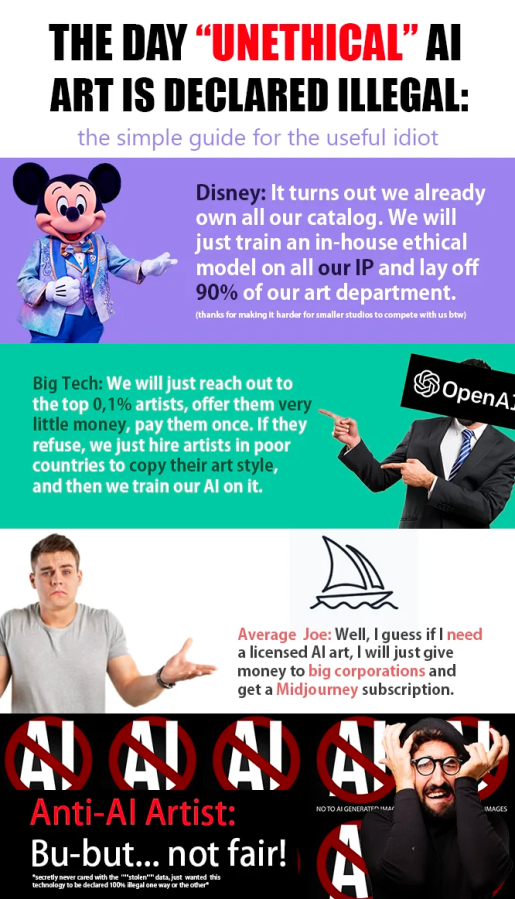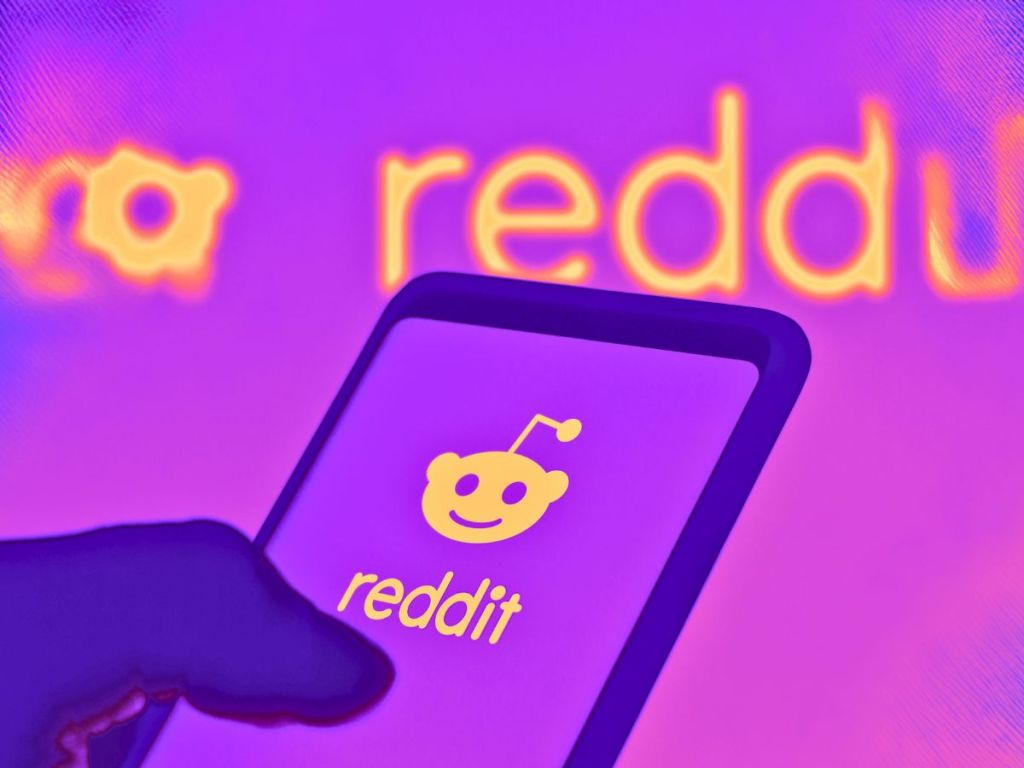AI art, film and photography, to put it lightly, aren’t welcome in creative circles. Actors in Hollywood are fighting against major studios using their likeness as “digital replicas”. Gamers who discover that their favourite game had used AI log onto the interwebs to voice their dissatisfaction.
It seems that the general attitude towards AI in the arts, at least on the internet, is that of contempt. Artists say that AI-generated content lacks authenticity, steals from human-made art without their consent and robs creatives of their jobs.
There’s science to back up this behaviour. Research in August shows that we as humans have a “natural bias” against AI-generated content because it poses a threat to our humanity.
However, in a small corner of Reddit, at least two niche communities have taken it upon themselves to pick apart and dismantle various arguments against AI. These communities are growing day by day.
A safe space for “pro-AI activism”
A community for those who support AI has formed in two subreddits.
r/DefendingAIArt describes itself as a community where “pro-AI people can speak freely without getting constantly attacked or debated”. r/AIWars bills itself as an avenue for debate if a discussion taking place on the former subreddit becomes too heated.
“We don’t want to stifle debate on the issue[s],” explained the moderator to members of both communities.
Both r/DefendingAIArt and r/AIWars rank in the top 4% of communities on the platform by size, each with 16,000 members. Members of both subreddits are highly active, and describe the variety of content they post as “pro-AI activism”.
So, what counts as “pro-AI activism”? Memes, mockery and a mission to dispel what’s perceived as “anti-AI” misinformation – including a theory that the anti-AI movement is an influence operation funded by big corporations.
“Pro-AI” activism: beliefs
At the core of the growing “pro-AI movement” is the belief that AI’s presence in creative spaces is inevitable. Thus, resistance is futile and we should find a way to work alongside AI tools. To pro-AI activists, automation, the ability to scale and decreased cost of artistic production brought about by AI actually make economic sense, because these tools could greatly benefit smaller creators and business owners.
On top of this, some also hold the view that artists who vehemently oppose AI are prioritising a “culture war”. They say that instead of citing statistics, artists are deploying emotional language whenever they put forward arguments rejecting AI. This, according to pro-AI punters, is not productive and nullifies the legitimacy of artists’ arguments against AI.
“Pro-AI activism”: artists don’t get copyright laws
The most crucial argument that pro-AI activists are imploring others to understand is the nuance behind copyright laws.
One main proposal that traditional artists are calling for is to expand copyright laws to better protect one’s intellectual property (IP). However, pro-AI activists think this is a lose-lose solution for all creatives involved. This is because instead of benefitting smaller creators, pro-AI activists say that it actually profits mega corporations like Disney and Mattel, that are known for fiercely protecting their assets and filing copyright lawsuits against lay people who use their material without consent.
For example, artists would no longer be able to even take inspiration from well-known characters in film or book franchises, which can hamper innovation. At the same time, only large conglomerates would be able to hire artists to draw 1,000 paintings, patent them, then use use AI tools to generate countless derivatives of the 1,000 patented paintings.
“When a struggling artist has their work illegally copied, they generally have no recourse because they do not have the legal teams necessary to punch upwards in the same way that corporations can punch down,” one Redditor in r/AIWars explained.
Most recently, a new theory on r/AIWars has surfaced. It claims that the ongoing anti-AI narrative dominating the internet is an “influence operation” funded by large corporations. While the initial argument holds water, this latter could be read as veering into conspiracy theory territory.
“There’s long been this techno-positivist community – both online and in real life – where people are interested in embracing new technologies and being ‘future forward’, and this is another manifestation of that,” Dr. Luke Munn, Research Fellow in Digital Cultures & Societies at the University of Queensland tells The Chainsaw.
“There’s growing disenchantment with technology and what it brings us. So, any movement on the internet like pro-AI activism would feel the need to ‘dial up’ their arguments.”
“Pro-AI” memes: dunking on artists
Another gripe expressed in r/DefendingAIArt and r/AIWars is what they view as hypocrisy and conceit from traditional artists who oppose AI. And what better way to call out anti-AI artists than by using visual media? On both subreddits, memes seemingly created with free-to-use meme generators attract substantial upvotes.

Another top-voted post on r/DefendingAIArt shows a meme depicting the abovementioned theory that the anti-AI movement is being funded by large corporations.

Creators on YouTube who produce video essays on AI are mocked, too. Here’s another top-voted meme by pro-AI activists depicting the “stereotypical” anti-AI YouTuber. According to the pro-AI members, creators raising awareness about the dangers of AI art are “pretentious” and regurgitate “generic”, virtue signalling talking points.

Both subreddits also repeatedly use terms to describe their targets. Among those are “luddites” or “ludds” (to describe artists who dislike AI art) and “mob” (to describe groups who criticise AI art users on other social media platforms).
Art tools and LLMs
It’s also apparent here that the pro-AI activists on both subreddits are mainly circling in on debates involving artists, as well as AI art generators like Stable Diffusion and Midjourney.
Large language models (LLMs) like ChatGPT and Google’s Bard seem to be absent in these debates, and aren’t receiving the same attention on r/DefendingAIArt and r/AIWars.
Associate Professor Liam Magee is a Principal Research Fellow at University of Western Sydney. He is currently investigating how AI works across “human subjectivities” (i.e. outside influences that shape our thoughts and feelings), suggesting to me that one possible reason behind the exclusion of LLMs is that AI art tools in particular have seen relatively more “dynamic development” when it comes to issues of ethics and copyright.
“There’s less of a concern about whether or not [tools like] Stable Diffusion or Midjourney actually reproduce reality per se, or whether they tell the ‘truth’,” Professor Magee said.
In other words, precisely because it’s so difficult to trace the exact sources of ‘inspiration’ for an AI-generated artwork, AI art tools, simply put, catch more flak compared to their textual counterparts like ChatGPT.
Us vs. them
Reddit is where the niche of niche communities convene – this is not new. However, with r/DefendingAIArt and r/AIWars, what’s occurring here is not just discourse. The subreddits’ participants are actively championing an ideology – and one that is not necessarily popular.
Governments around the world are clamping down on Big Tech to curb their monopolistic powers, but the debate around copyright, songwriters, painters and actors is more layered. It involves small and big business, people making millions and people scraping by, and questions as to what extent all art is influenced by other art.
“There’s long been this idea that in order for art to be authentic, it has to reveal the hand of the artist. You’ll need to see pencils, brush strokes, or some sort of human element for an artwork to be considered genuine,” Professor Munn, a digital artist, tells me.
“The art world has been through a lot of these debates in history. That people are policing what is considered art can be seen as regressive. Does this mean we all have to go back to painting with oil on canvas? So, there’s both sides to the argument.”
Who knows if the activism on r/DefendingAIArt and r/AIWars will materialise into something more substantial? As of now, Redditors on both these forums seem pretty happy in their own little echo chamber.
“I think the art world is not entirely antagonistic to AI. There’s some inertia here about trying to open up art, because some [artists] might have a more nuanced or critical understanding of how to use these technologies,” Professor Munn says.





